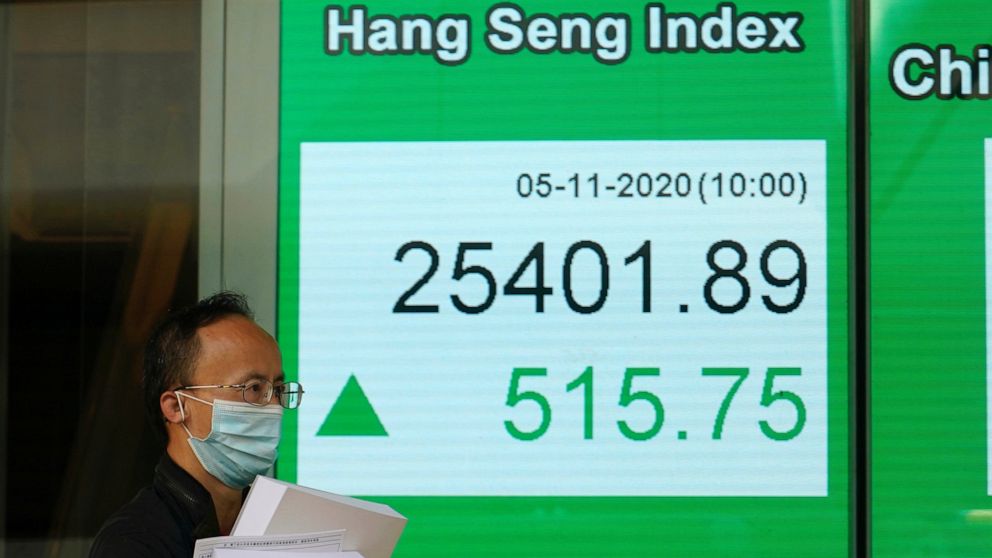World markets rally as markets shrug off election limbo
U.S. futures and world shares have surged as investors await the outcome of the U.S. presidential election and embrace the upside of more gridlock in Washington
U.S. futures and world shares surged on Thursday as investors awaited the outcome of the U.S. presidential election and embraced the upside of more gridlock in Washington.
European markets opened higher after a day of gains in Asia, while the fate of the U.S. presidency remained undecided as neither President Donald Trump or Democratic challenger Joe Biden had secured the 270 Electoral College votes needed to win.
Analysts say a Congress likely once again split between a Democratic House and a Republican Senate is expected to keep U.S. tax and other policies relatively stable amid legislative stalemates. And share prices tend to rise regardless of who is in the White House.
Taking reassurance where they can, “markets have been happy to presume that this Democratic White . . . House and Republican Senate is the ‘Goldilocks’ outcome. In other words, a ’Goldilocks Gridlock,‴ Mizuho Bank said in a commentary.
An expectation that Biden has a chance of winning also has raised hopes that U.S. foreign policies might be “more clear,” said Jackson Wong, asset management director of Amber Hill Capital. He added, “investors are cheering for that. That’s why the markets are performing well.”
But while most markets have rallied since Tuesday’s election rising coronavirus counts, job losses and recessions remain a dark backdrop for many countries.
Britain’s FTSE 100 edged up 0.1% to 5,893.80 as England began a four-week lockdown Thursday that will keep closed all shops selling items deemed to be non-essential, such as books and clothes. Scotland, Wales and Northern Ireland also have announced wide-ranging restrictions on economic activity.
The Bank of England increased its monetary stimulus by a bigger than anticipated 150 billion pounds ($195 billion) to help the economy weather the new lockdown measures. But as expected it kept its benchmark interest rate at an ultra-low 0.1%.
In Paris, the CAC 40 gained 1% to 4,969.79, while Germany’s DAX also gained 1% to 12,449.54.
The future for the S&P 500 gained 1.4% and the future for the Dow industrials was up 1%.
Thursday’s rallies followed a strong performance overnight on Wall Street, where the S&P 500 rose 2.2% for its best day in five months. The Nasdaq notched its biggest gain in more than six months as traders doubled down on technology stocks that are seemingly immune to pandemic shocks that bring more and more activity online.
In Asia on Thursday, Hong Kong’s Hang Seng surged 3.3% to 25,695.92 while Tokyo’s Nikkei 225 index climbed 1.7% to 24,105.28. South Korea’s Kospi jumped 2.4% to 2,413.79. In Australia, the S&P/ASX 200 gained 1.3% to 6,139.60. The Shanghai Composite index rose 1.3% to 3,320.13.
Shares also rose in Taiwan and Southeast Asia.
Indonesia’s stock benchmark rose 3% after the government reported the country fell into recession for the first time in two decades in the past quarter. The economy, Southeast Asia’s largest, shrank at at 3.49% annual rate in July-September, though that was an improvement over the 5.3% contraction in the previous quarter.
Looking ahead, continued Republican control of the U.S. Senate may further stymie an agreement on a fresh infusion of aid for the economy following the expiration of an earlier package of stimulus measures in July. That could add to pressures on the Federal Reserve to do even more on its own to support the economy, which could send the dollar lower against the euro and other currencies.
The Fed is meeting this week and had been due to announce its latest decision on interest rate policy on Thursday. But it may hold off on determining whether and how to expand its economic support until after final election results are confirmed.
In other trading:
U.S. benchmark crude oil lost 31 cents to $38.84 per barrel in electronic trading on the New York Mercantile Exchange. Overnight, it gained $1.49 to $39.15 per barrel. Brent crude, the international standard, gave up 27 cents to $40.96 per barrel.
The U.S. dollar edged up to 104.27 Japanese yen from 104.26 yen. The euro strengthened to $1.1782 from $1.1736.
![]()


